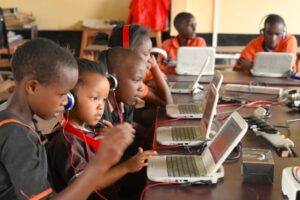The Role of Technology in Enhancing Education in Nigeria

The Role of Technology in Enhancing Education in Nigeria
Technology plays a vital role in enhancing education in Nigeria by increasing access to quality learning materials, promoting interactive learning experiences, and fostering personalized education. With technology, students in remote areas can access the same quality of education as those in urban centers, bridging the educational gap between rural and urban areas.
Technology provides students with access to a vast array of educational resources, including e-books, online courses, and educational apps. Adaptive learning technologies tailor instruction to individual learning styles and paces, enabling educators to address diverse student needs effectively. Interactive multimedia content, such as videos, simulations, and gamified learning experiences, captivates students’ attention and motivates them to participate actively in their education.
E-learning platforms, such as Edusko and LearnAM, offer courses, tutorials, and learning materials tailored to Nigerian students. Mobile learning apps provide flexible learning opportunities, enabling students to access educational content anywhere, anytime. Artificial intelligence-powered tutoring systems offer personalized learning experiences, adapting to each student’s pace and learning style. Virtual reality creates immersive learning experiences, making complex subjects easier to understand.
However, infrastructure limitations, such as unreliable internet connectivity and inconsistent electricity supply, can hinder the effective integration of technology in education. Comprehensive digital literacy training for educators is also crucial to ensure they can effectively integrate technology into their teaching practices.
Investments in reliable internet connectivity, consistent electricity supply, and access to devices are essential for effective technology integration. Stakeholders, including government, private sector, and civil society, must collaborate to ensure every student has access to technology’s benefits in education. With technology, Nigeria can revolutionize its education system, providing students with the skills and knowledge necessary to succeed in the 21st Technology plays a vital role in enhancing education in Nigeria by increasing access to quality learning materials, promoting interactive learning experiences, and fostering personalized education. With technology, students in remote areas can access the same quality of education as those in urban centers, bridging the educational gap between rural and urban areas.
Technology provides students with access to a vast array of educational resources, including e-books, online courses, and educational apps. Adaptive learning technologies tailor instruction to individual learning styles and paces, enabling educators to address diverse student needs effectively. Interactive multimedia content, such as videos, simulations, and gamified learning experiences, captivates students’ attention and motivates them to participate actively in their education.
E-learning platforms, such as Edusko and LearnAM, offer courses, tutorials, and learning materials tailored to Nigerian students. Mobile learning apps provide flexible learning opportunities, enabling students to access educational content anywhere, anytime. Artificial intelligence-powered tutoring systems offer personalized learning experiences, adapting to each student’s pace and learning style. Virtual reality creates immersive learning experiences, making complex subjects easier to understand.
However, infrastructure limitations, such as unreliable internet connectivity and inconsistent electricity supply, can hinder the effective integration of technology in education. Comprehensive digital literacy training for educators is also crucial to ensure they can effectively integrate technology into their teaching practices.
Investments in reliable internet connectivity, consistent electricity supply, and access to devices are essential for effective technology integration. Stakeholders, including government, private sector, and civil society, must collaborate to ensure every student has access to technology’s benefits in education. With technology, Nigeria can revolutionize its education system, providing students with the skills and knowledge necessary to succeed in the 21st century.century.






